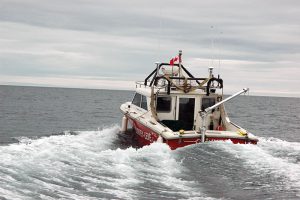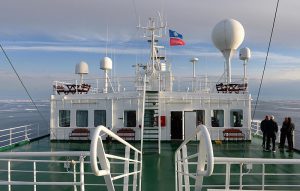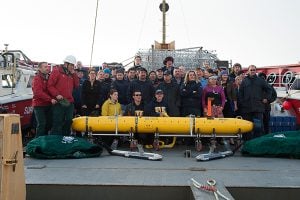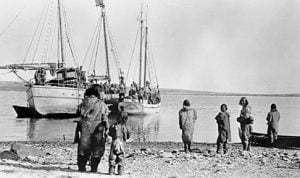
History
2014 Victoria Strait Expedition
This year's search is about much more than underwater archaeology. The Victoria Strait Expedition will contribute to northern science and communities.
- 1205 words
- 5 minutes
This article is over 5 years old and may contain outdated information.
History

Parks Canada’s successful search for Franklin’s lost ships created a huge surge of public interest in the history of the Canadian Arctic and practice of maritime archaeology. This attention is not misplaced, given the discovery of HMS Erebus will be one of the most important underwater archaeological discoveries of the 21st century. The shipwreck, its cargo, and the personal possessions of the crew may answer many of the questions surrounding the loss of Franklin’s two ships, the subsequent actions of the men when they took to the ice, and their eventual demise.
This summer’s discovery will be the beginning of a long and arduous process of field work, analysis and publication. Investigation of the site could take decades given the unforgiving climate of the north and the high standards of professional maritime archaeologists. Fortunately Parks Canada has already demonstrated its excellent expertise and capacity on many other sites, including the 16th century Basque shipwrecks at Red Bay, Labrador.
Will the end result be worth the cost and years of effort? Those of us fortunate enough to have dived on similarly intact sites have no doubt it will yield great information and insights. Maritime history is more than studying he fittings on a lost ship – rather, it teases out the details of human history, national economics, trade routes and the forgotten ways of shipboard and personal life of our ancestors. Seafarers have visited Canada for six centuries, and thousands of sailing ships, steamers, and riverboats were lost off our coasts and along our rivers. Truly untouched sites are rarities, and when an Erebus find is made, the potential knowledge gain is huge, particularly when cold water has preserved the smallest artifacts. In the case of the Franklin expedition, we anticipate many new insights into the story of Franklin’s search for the Northwest Passage, and the resultant tragedy.
While the 2014 Franklin search made headlines, a number of smaller but still important projects have been underway over the past few years. The venerable Underwater Archaeological Society of British Columbia continues to grind away on its tenth regional survey of shipwrecks on northwest Vancouver Island, searching for and documenting some 12 historic shipwreck sites.
In the far north the Institute of Nautical Archaeology has recently completed its ninth field season studying the many stern wheel riverboats in collaboration with the Government of Yukon. One remarkable find in 2008-10 was the A.J. Goddard – a small and undamaged riverboat that sank in Lake Laberge in 1901. Some of the Yukon vessels lie above water in old shipyards along the river, and are so well preserved the pencil notations from the original shipwrights can still be seen on hull timbers, 115 years later. And finally, sporadic work continues at the Royston Breakwater on eastern Vancouver Island, where fifteen historic windjammers, steam tugs, whalers, and famous First Word War/Second Word War frigates and destroyers lie awash within a few meters of each other.
While the Erebus discovery is a tremendous accomplishment, Canada has many additional maritime archaeological sites of quality. The stories of our ancestors and nation will evolve as new sites are located and then documented by maritime archaeologists and historians. The adventure – and a great deal of hard work – will continue.
Are you passionate about Canadian geography?
You can support Canadian Geographic in 3 ways:

History
This year's search is about much more than underwater archaeology. The Victoria Strait Expedition will contribute to northern science and communities.

History
First official day of the 2014 search for Sir John Franklin’s lost ships

History
Why this summer’s search for the lost ships of the Franklin Expedition will be the biggest and most advanced ever

Exploration
A century after the start of the thrilling expedition that strengthened claims to Canadian sovereignty in the Arctic, the first Canadian Arctic Expedition remains a largely unknown part of the country’s history